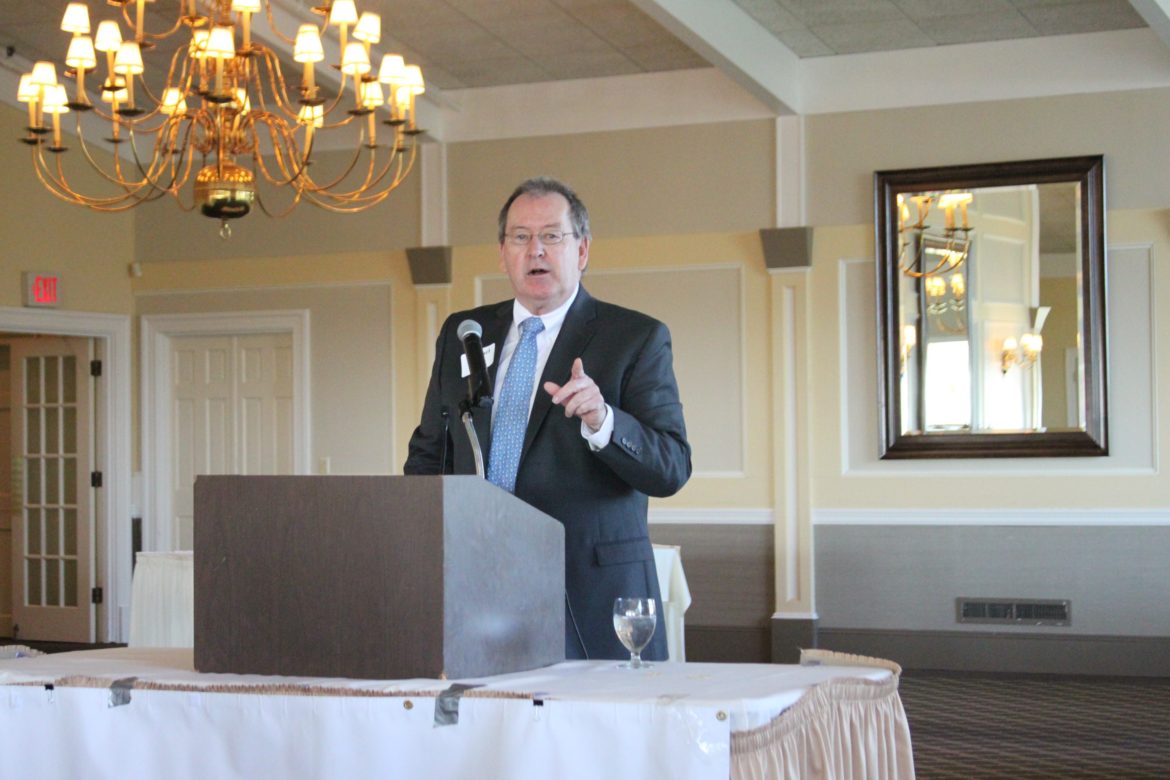
Charlie Breitrose
Town Manager Michael Driscoll spoke at the Watertown Belmont Chamber of Commerce’s State of the Towns Breakfast.
Watertown and Belmont are undergoing development booms, which has bolstered town budgets, but also come with struggles, such as traffic and schools bulging at the seams, officials said at the Watertown Belmont Chamber of Commerce’s State of the Towns breakfast on Thursday.
Watertown is about to see more than 600 apartments come online on Arsenal Street this year, said Assistant Town Manager Steve Magoon. The town seeks to increase its revenue by encouraging more hotels and restaurants.
“We had 15 additional liquor licenses approved by the Legislature, which will be an important component in brining restaurants and economic growth the community,” Magoon said. “The Marriott Residence Inn is a 150 room hotel expected to be completed in August.”
A new project in Belmont, and just over the line from Watertown, is a mixed use project in Cushing Square that will add 115 new housing units and retail, said Belmont Selectman Chairman Sami Baghdady.
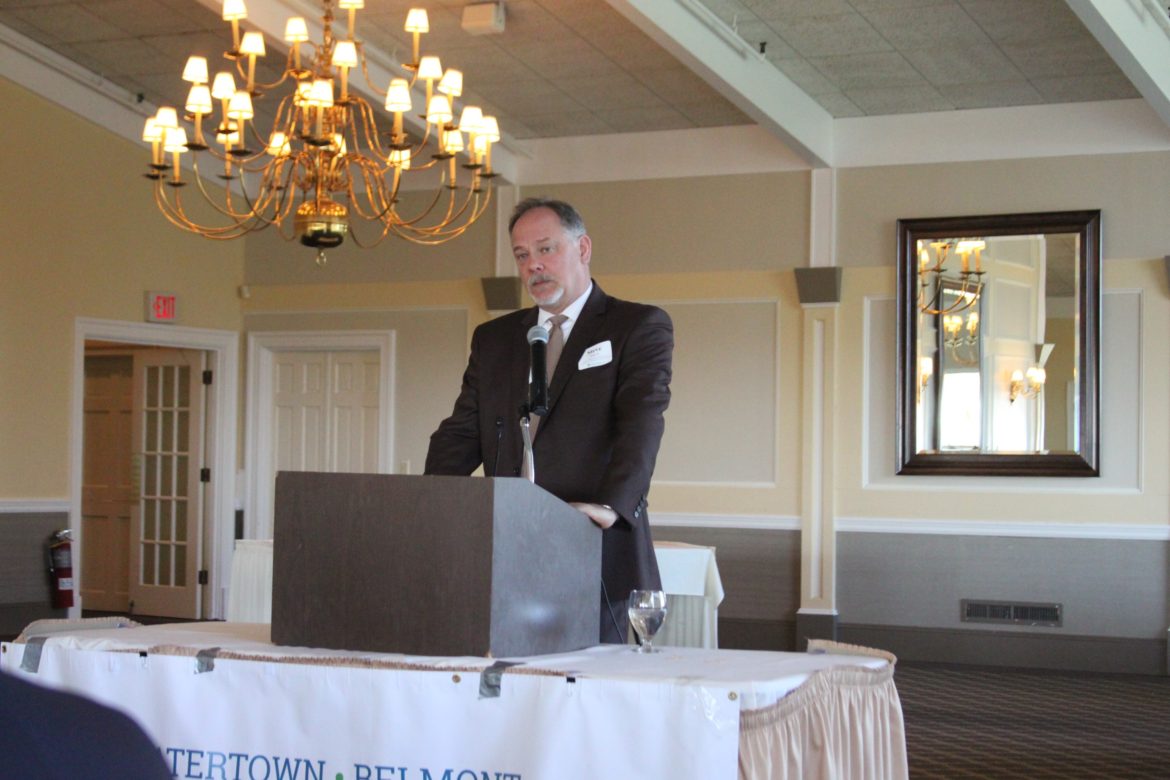
Charlie Breitrose
Steve Magoon, Watertown’s Assistant Town Manager spoke about traffic and development at the Chamber’s breakfast.
As Watertown seeks solution to crowded classrooms, Belmont has seen even bigger enrollment increases. The town added 426 students to go up to 4,300 from 2010 to 2015, said Belmont Town Administrator David Kale
Some worried about the increasing development in Watertown adding to the traffic problems. Magoon said the traffic is a mixed bag.
“Traffic can be a good thing,” Magoon said. “Places with no traffic are places nobody wants to be.”
This did not sit will with many at the breakfast. Magoon added that the town is looking for ways to encourage businesses to cut the number of single-occupancy vehicle trips to their locations, and Watertown is creating a Transportation Management Association with a planned public shuttle system.
Developer Bill McQuillan of Boylston Properties, said that Magoon was not wrong. He noted that his firm has plans to transform the Arsenal Mall.
“We bought a retail property that was not all that successful and will transform it into something more successful and there will be more traffic,” McQuillan said. “We will do the best we can to mitigate the new traffic.”
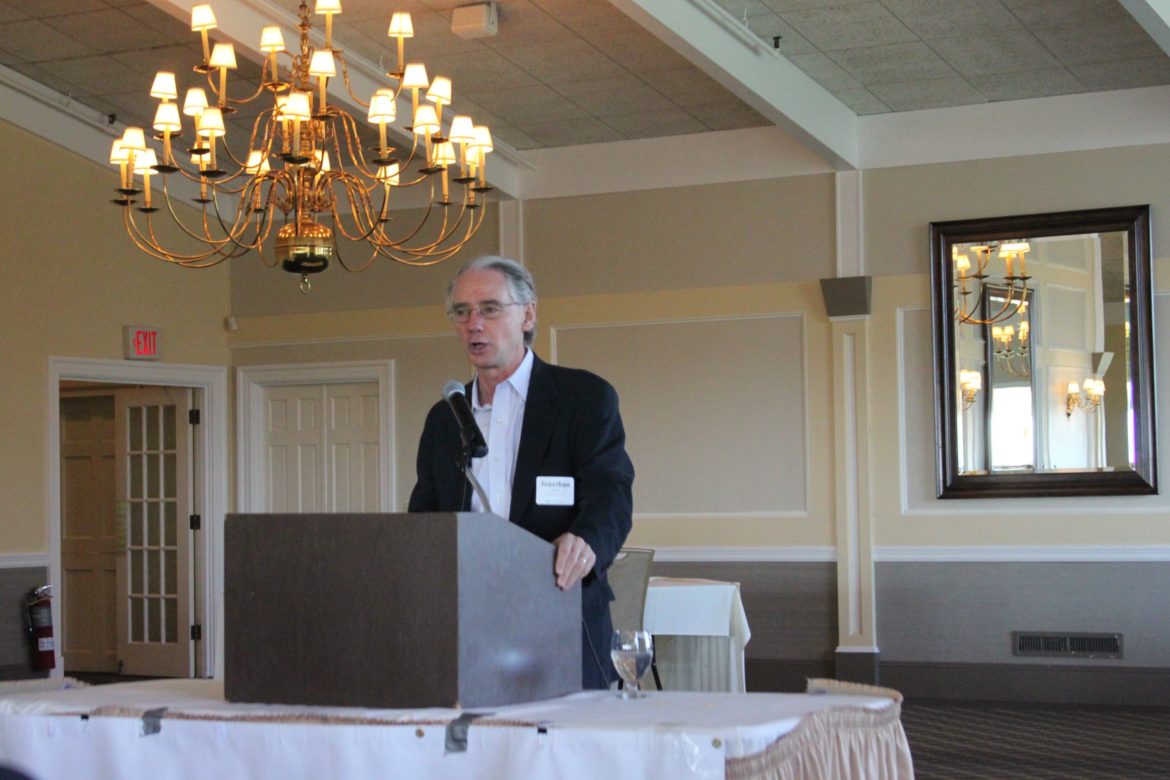
Charlie Breitrose
Watertown State Rep. Jonathan Hecht is working on several efforts to improve traffic in town.
Watertown State Rep. Jonathan Hecht said the state Department of Transportation is running a study of the Arsenal Street Corridor to find ways to improve traffic flow and public transportation on the key artery.
He has also been working on completing the Watertown Greenway. Now it goes from Arlington Street to Nichols Avenue, but there are plans to link it to Fresh Pond along the former rail road tracks, and to the Charles River Path.
Another effort to improve traffic is the study of the Mt. Auburn Street/Fresh Pond Parkway intersection.
“The 71 and 73 buses go through the intersection – after a while,” Hecht said. “We are looking for ways to improve traffic through the area.”
Baghdady reported that plans to close the Waverley Commuter Rail Station have been stopped, at least for the foreseeable future.
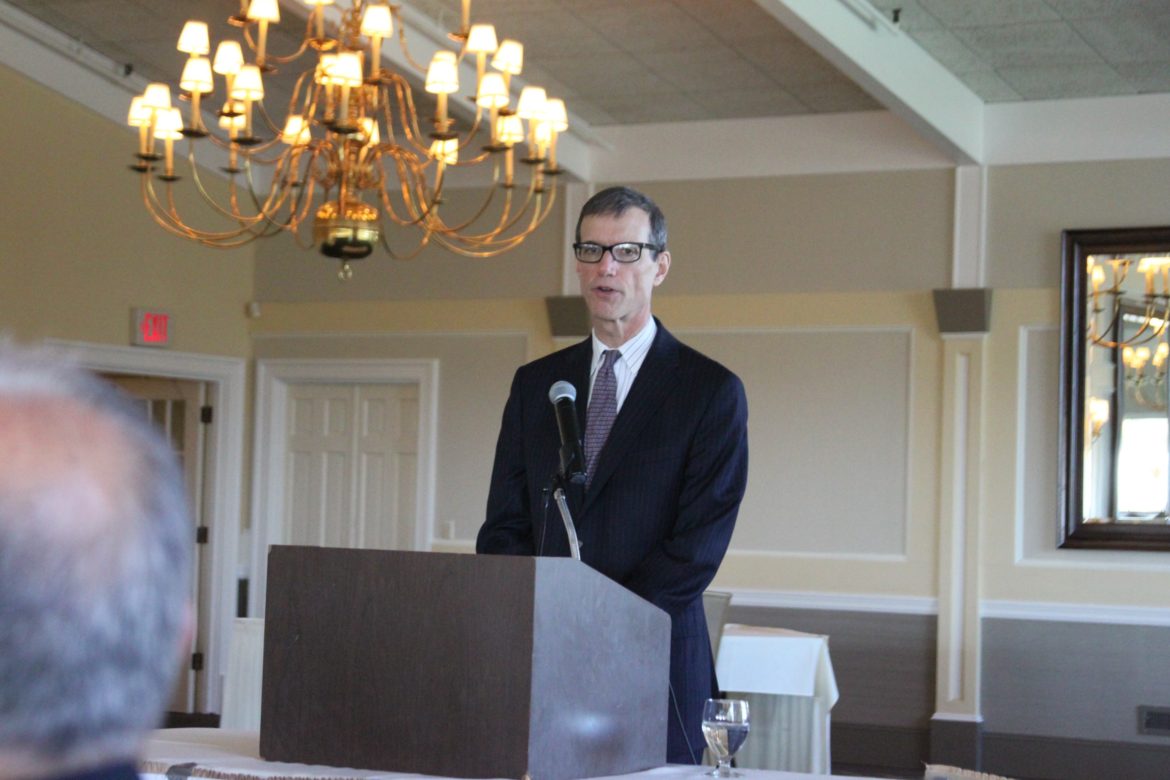
Charlie Breitrose
The improvements at the MBTA have pleased State Sen. Will Brownsberger.
State Sen. Will Brownsberger, who represents both towns, said he is pleased with the direction the Department of Transportation and particularly the MBTA are going. In the past, the budgets have been impenetrable.
“With Mike Driscoll’s (Watertown Town) budget, you know where every penny is going, but you couldn’t get that from the MBTA,” Brownsberger said. “With the (T’s) Capital Plan you really couldn’t get a straight answer.”
Brownsberger said the Fiscal and Management Control Board appointed by Gov. Charlie Baker is working on making the current system reliable before it starts looking at expanding services.
Town Budget
Watertown Town Manager Michael Driscoll discussed the town’s good financial state, including the AAA bond rating from Standard and Poor’s, and the Fiscal 2017 budget of $126 million.
The town has one of the lowest average tax bills ($5,600) of area towns, Driscoll said. Arlington’s is $7,000, Newton’s is $9,300 and Belmont’s average bill is $9,700.
The town also has plans to pay down the unfunded pension liability by Fiscal 2020. The town will increase the annual pay down from $15 million in fiscal 2017 (which starts July 1, 2016), to $17 million in Fiscal 2019, but in Fiscal 2020 it will be just around $2 million, freeing up $15 million. This money will be used to address the town’s other unfunded area – Other Post Employment Benefits (OPEB) – which is now $163 million.
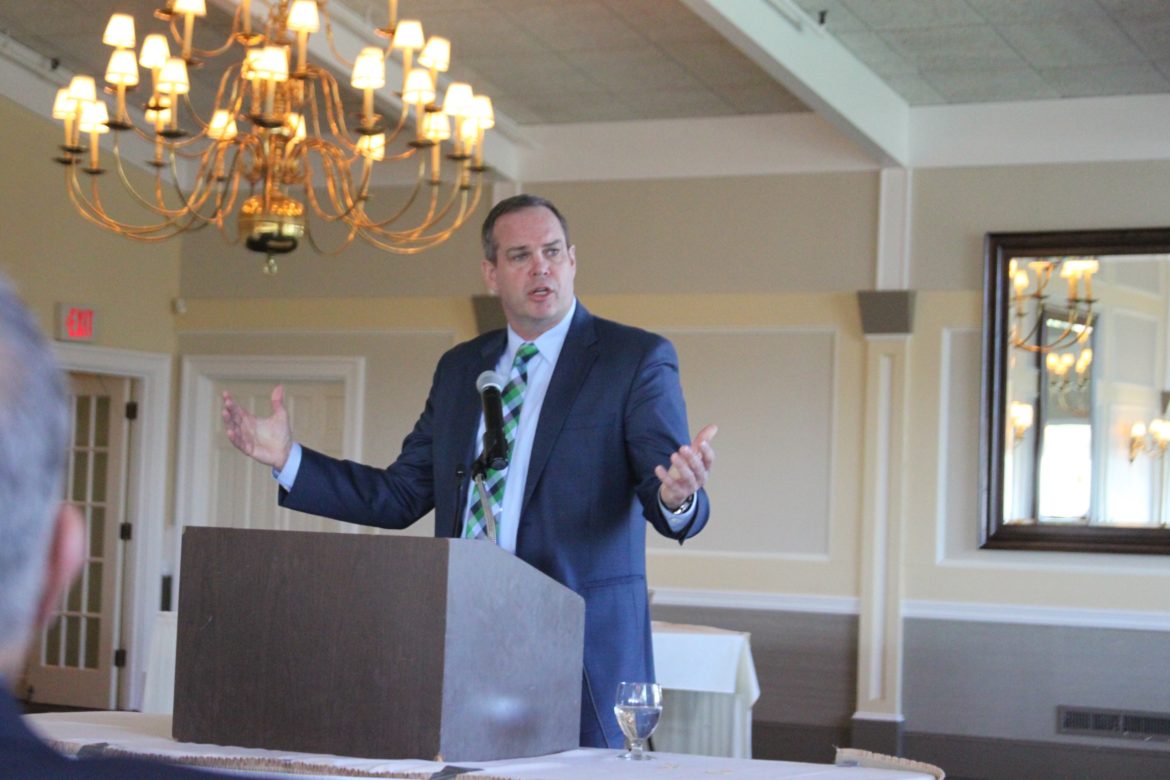
Charlie Breitrose
The State Legislature has provided more money to help the Watertown Police fight the opiate crisis, said Watertown State Rep. John Lawn.
State Budget & Issues
The state’s budget remains tight, despite the strong economy in Massachusetts said Belmont State Rep. Dave Rogers. One of the main reasons is health insurance.
“Forty cents of every dollar in the state budget goes to health care,” Rogers said.
Watertown State Rep. John Lawn said he has been working on efforts to fight the opiate crisis in Watertown.
“We got relief for the Police Department to work on (the drug issue),” Lawn said. “Last year we were finally successful in getting $50,000 to work on drug use and the opiate crisis. (On Wednesday) we got it in the budget for next year.”
He is also trying to bring in more dollars to town to pay for the rising costs of special education in town.
Another issue he and his colleagues are working on are regulations for drivers for Uber and Lyft, and finding a way to make sure the taxi cab industry is not badly hurt by the internet ride services. This includes banning them from picking up at Logan Airport and the Boston Convention & Exhibition Center for 5 years.
Bizarre way of dealing with traffic. Redesign and build roads THEN study traffic? Absurd.
Let me add: Watertown permitted all of these new projects, apartments and stores without considering the impact on traffic and parking and NOW wants to study the problems? What am I missing?
Bruce, your point is the exact reason I voted against adopting the RMUD zoning ordinance in March. In theory, a mixed-use district on Arsenal is exciting and welcomed. In reality, we have to ensure the infrastructure exists to support these developments.
Part of the problem is that development keeps happening, but the MBTA and DOT are 20 years behind in keeping up with transportation demand. We must get ourselves ahead of the curve, and for the most part, that means more public transit capacity.
Steve Magoon: “Traffic can be a good thing.” I’d like to see him shouting that in the middle of Galen Street at 5:30pm. I doubt anyone would see the humor.